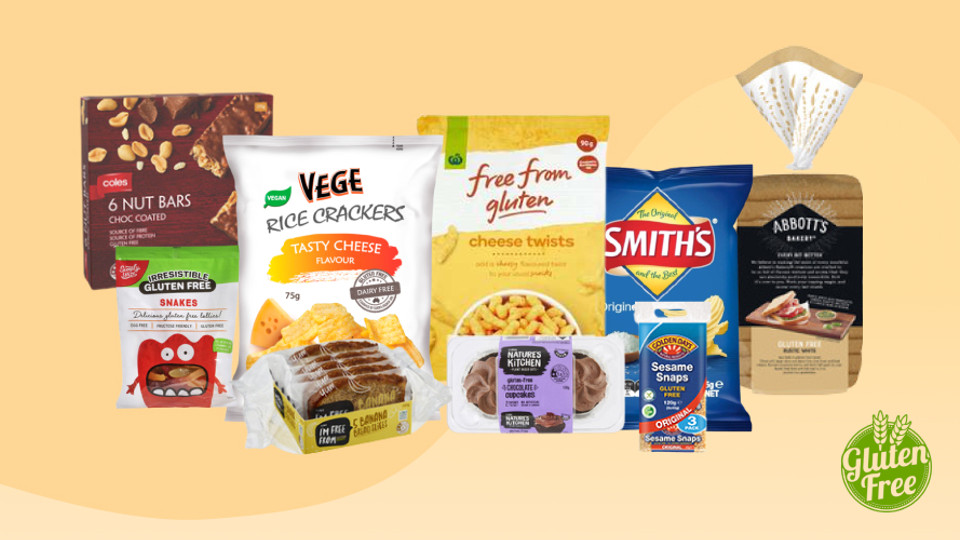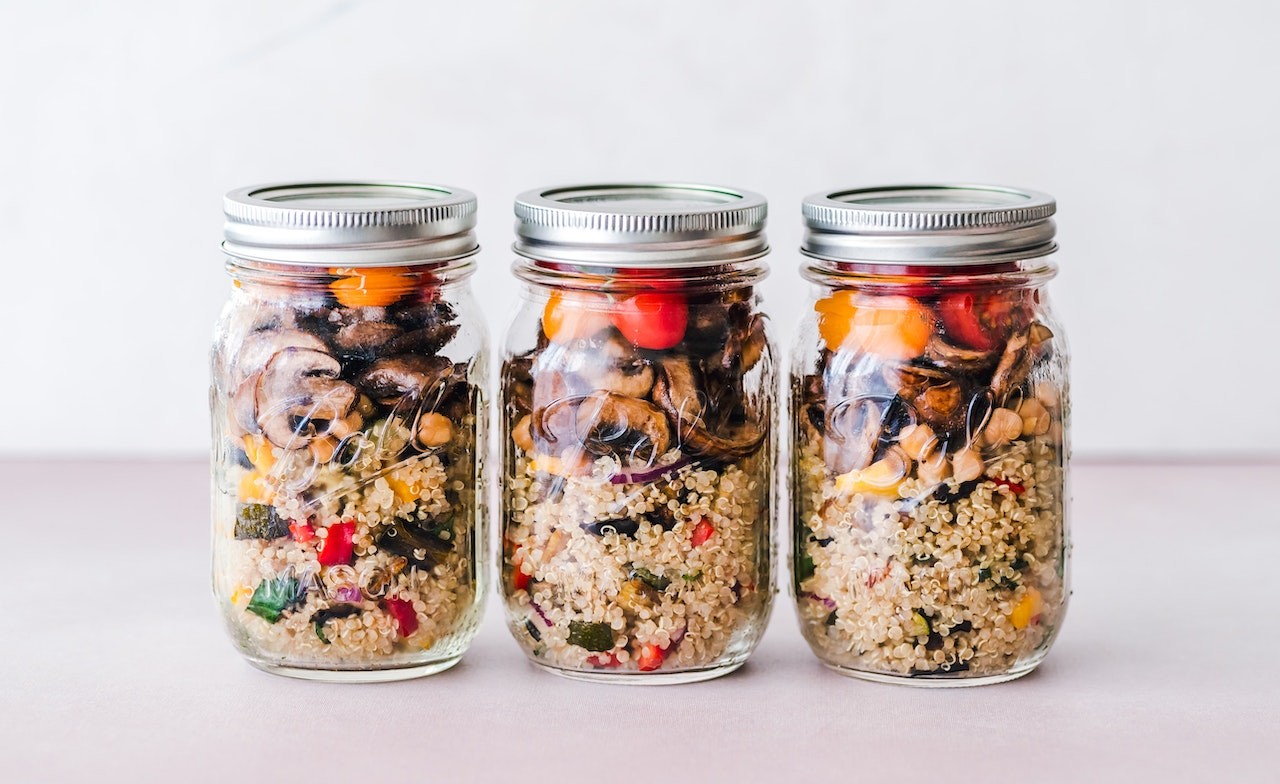
10 Popular Gluten-free Junk Food Products
Relying on claims like gluten-free can mean your fueling on junk food rather than nourishing your body with nutritious whole foods.
Here are some 10 popular gluten-free junk food products you’ll find on the supermarket shelves.
- Smith’s Crinkle Cut Original Potato Chips – plain chips are naturally free of gluten, it’s the flavoured ones with thickeners, soy and starches you have to look out for.
- Woolworths Free From Gluten Cheese Twists – if you’re a twisties fan, these may give you the same thrill.
- Vege Chips Rice Crackers Sour Cream & Chives – combine rice flour, sugar, salt, corn start, sunflower oil, natural flavours and yeast extract and you have yourself cracker that will keep you going back for more.
- Coles Gluten Free Choc Coated Nut Bar – don’t let the high protein and fibre claim fool you!
- Simply Wize Irresistible Snakes – not only gluten-free but egg-free too! (I didn’t expect lollies to have eggs in them)
- Golden Days Snacks Sesame Snaps – just three ingredients: sesame seeds, glucose and sugar.
- Coles I’m Free From Banana Bread – 20% bananas and a whole lot of questionable ingredients but it’s gluten-free!
- Abbott’s Bakery Gluten-Free Rustic White Bread – I just love sugar, canola oil, molasses and thickeners in my bread, don’t you?
- Coles Natures Kitchen Vegan Chocolate Cupcake – long ingredients list with very little whole food. Even the apple puree has some veggie gums and natural flavour for good measure.
- Bfree Multigrain Wraps – too many ingredients for me!
What is gluten?
Gluten is a protein that is found naturally in wheat, rye, barley and triticale. Gluten is also added to food products to act as a binder or glue, holding the ingredients together and helping the food maintain its shape.
You’ll also find gluten lurking in “natural” flavours, supplements, medications and personal care products such as toothpaste.
People living with coeliac disease are unable to tolerate gluten and can suffer serious reactions due to the inflammatory response and irreparable damage to the lining of their small intestines.
Other conditions may warrant a strict gluten-free diet including inflammatory bowel disease, rheumatoid arthritis, lupus, psoriasis and Hashimotos.
Gluten-free diets may also prove beneficial for the management of chronic skin issues and gastrointestinal conditions such as Irritable Bowel Syndrome. Those with a wheat allergy also steer clear of a lot of gluten sources by naturally avoiding wheat products.
Are gluten-free foods healthier?
One of the biggest myths of a gluten-free diet is that it’s healthier for you.
Food manufacturers have jumped on the gluten-free bandwagon using the term to market their products as a healthy option. As a result, the supermarket shelves are packed with highly processed gluten-free junk foods. You’ll find cookies, doughnuts, muffins, bread, crackers, chips, lollies and ice cream all labelled proudly with “gluten-free”. Some company’s even use the dietary exclusion as a brand such as the Woolworth Free From Gluten or Coles I’m Free range.
It’s very easy to mistake these gluten-free products and brands as good for you, but if you want to consume a healthy diet and nutrition is your priority, you need to read the ingredients list and nutrient panel. Most of these products have excess sugar, sodium, vegetable oils, flavourings and additives.
Overconsuming highly processed, packaged gluten-free foods could result in complaints such as gastrointestinal issues, weight gain and fatigue.
That being said, you can eat an incredibly balanced and nutritious gluten-free diet.
For many, adopting a gluten-free diet means they ditch many processed foods, like the junk foods listed above, in place for a varied whole food diet. If you’ve tried cutting out gluten and noticed weight loss, it’s likely to be more about reducing your intake of refined carbohydrates and processed foods than gluten.
There are a lot of nutritious gluten-free grains and flours such as quinoa, buckwheat, brown rice or millet. Not only delicious to eat and versatile, but these ingredients also provide a range of vitamins, minerals, fibre and antioxidants beneficial for health.
Should I be gluten-free?

Gluten itself isn’t an essential protein, so it’s not a necessity. For many people without coeliac disease or wheat sensitivity, they find reducing their intake of gluten can be beneficial to their overall health.
The main health risk of going gluten-free if you don’t medically need to is missing out on nutrients such as B vitamins, iron, magnesium and fibre from whole grains.
Ensuring you consume a diverse and balanced diet including gluten-free whole grains can help to prevent nutrient deficiencies. And avoiding some of the common gluten-free dietary traps will help you work towards optimising your health rather than sabotage it.
Going gluten-free may also save you some money if you do it correctly! Eliminating the packaged foods from your diet and avoiding trending gluten-free products can cut down your shopping bill as these tend to be more expensive than natural and fresh whole foods.
Top mistakes people make when switching to a gluten-free diet
- Not planning meals in advance, especially in the initial stages of adopting a gluten-free diet.
- Not analysing nutrient labels and ingredient lists.
- Defaulting to packaged gluten-free products like the above.
- Total avoidance of naturally gluten-free whole grains.
- Ditching whole food carbohydrates such as potato and sweet potato.
- Consuming foods with hidden gluten such as flavoured chips, marinades, salad dressings, lollies, plant-based meats and condiments.
- Not getting professional advice.
As with any dietary change, there are benefits and disadvantages to consider. If you’re looking to start a gluten-free diet, it pays to talk to a health professional such as a qualified nutritionist, dietitian or naturopath to get the facts and individualised health advice.




